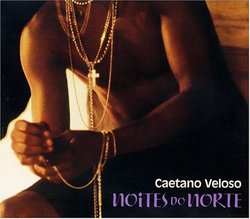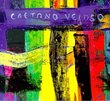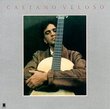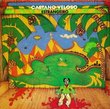| All Artists: Caetano Veloso Title: Noites Do Norte Members Wishing: 0 Total Copies: 0 Label: Musicrama Release Date: 1/16/2001 Genres: International Music, Latin Music Styles: South & Central America, Brazil Number of Discs: 1 SwapaCD Credits: 1 UPC: 632427747321 |
Search - Caetano Veloso :: Noites Do Norte
 | Caetano Veloso Noites Do Norte Genres: International Music, Latin Music
New, 2000 Release by Legendary Singer/Songwriter/Guitarist from Bahia. Veloso was Inspired by the Works of Brazilian Political Writer, Joaquim Nabuco, Translating them Into Musical Form on this Recording. Also Included is ... more » |
Larger Image |
CD DetailsSynopsis
Album Details New, 2000 Release by Legendary Singer/Songwriter/Guitarist from Bahia. Veloso was Inspired by the Works of Brazilian Political Writer, Joaquim Nabuco, Translating them Into Musical Form on this Recording. Also Included is a Song that Pays Tribute Toone of Brazil's Rock Heroes, Raul Seixas ('rock in Raul'), as Well as a New Rendition of Veloso's Biggest Hit, 'alegria, Alegria'. Cellist Jacques Morelenbaum and the Master Himself Produce this Album, which is a Must for all Brazilian Music Fans. Similar CDs
|
CD ReviewsCaetano at his very best Christopher Carton | Bakersfield, CA United States | 10/27/2002 (5 out of 5 stars) "It just doesn't get better than this. Some Caetano CD's have a song or two that you feel you can pass up. This is not one of those CD's. He goes in many different directions, from the title track, a poem recital set to a beautiful chord arrangement, to "Rock 'n Raul," a straightforward rocker like nothing you've heard from Caetano before, to "Meu Rio," an acoustic number reminiscent of the Caetano we've come to know and love. But what all the songs have in common is that they build into your psyche, making you want to hear them all every time you play the CD." I just love this album aoleo | Bridgeport, CT United States | 10/12/2001 (5 out of 5 stars) "I was in my last year of high school when I first heard the song "Estrangeiro" (Foreigner) by Caetano Veloso. It was love at first sight (at first hearing, actually). Initially, I was struck by the power and uniqueness of its sounds. Later, the intelligence and sophistication of its lyrics inspired me. At that time, I was already a Caetano's fan. That song, though, made me start my Veloso's record collection and go to his concert for the first time. The CD named after the song I fell in love with was the first of a great sequence of albums that Caetano released throughout almost a decade. Followed "Estrangeiro" (1989), among other album, the masterpieces "Circuladô" (1991), "Circuladô Vivo" (1992), "Fina Estampa" (1994), "Fina Estampa ao Vivo" and "Livro" (1997) - the last winning "best album of the year" in the Latin Grammy Award. I bought all of these records and went to all his concerts during the decade that followed. The sequence of good albums was so amazing that I started to believe that their author was infallible; that whatever he produced was unquestionably good. And I don't think I was alone; during the 90s Caetano became a national, maybe even international, unanimity. Nevertheless, the CD "Prenda Minha" (1999) came to reinforce the Brazilian popular saying that declares that "all unanimity is dumb". The album is not that bad, but Caetano raised our standards to such a level that we always expect his works to near the perfection. Were this record signed by other artist, maybe, I wouldn't be as critic. This album has actually a very good beginning. I love the sequence composed by the first four songs. The CD opens with a version of the tune "Jorge da Capadócia" by Jorge Ben. The song starts smoothly and grows along with the introduction of more and more percussion instruments - it starts with hands clapping and progresses to a complete group of percussion. The second song appears after an incredible transition in which the intense sound of drums and timbales is replaced by an ensemble of brass instruments that opens the mellow tune of the title song "Prenda Minha". A not less impressive transition brings the beautiful "Meditação" (Meditation) - a composition by Tom Jobim and Newton Mendonça. The fourth song, "Terra" (Earth), is an excellent re-record - rich in a new arrangement (credited, as "Jorge da Capadócia", to all the band - all other arrangements are signed by Jaques Morelenbaun) and strong interpretation by Caetano, who is backed up by the versatile band under maestro Morelenbaun's command. But that's it. What comes after the fourth song does not tells me much. They are 14 more tunes. Most of them re-record of old successes, which bring little or no excitement to me, neither in the arrangement, nor on the lyrics. When I got "Noites do Norte" (Nights of the North), the latest work of Veloso, the first authorial since "Livro", once again, I was disappointed. I really like when Caetano shows us his experimental side, as he did in "Circuladô", "Livro" or "Estrangeiro", but I felt that this time he "lost the hand". For instance, that happens when he sings/recite the beautiful text by the Brazilian abolitionist Joaquim Nabuco, the title song "Noites do Norte". It's not the first time Veloso attempted to "sing" prose - he did it before successfully in "Circuladô Vivo" ("Americanos") and "Prenda Minha" ("Verdade Tropical"). All the bravura of the century old essay (1900) didn't help in this case - he should just have kept his original idea and put the excerpt in the insert of the CD. The homage to Raul Seixas (precursor of Brazilian rock)"Rock'n'Raul" has a nice rock arrangement that brings to Caetano's MPB some contemporary rock and techno flavor. The rhymes of the lyrics, however, don't do it to me ("Esbórnia na Califórnia/Dias ruins em New Orleans/O grande mago em Chicago/.../Uma plantation de maconha no Wyoming"), as Veloso's vacillation as he tries to sound like a rock singer. Having said that, I should add, or reiterate, were this someone else's recording, I would probably find it very good. But I expect more from Caetano. This, however, didn't keep me from giving "Noites do Norte" another chance. Likewise most of Caetano Veloso's other albums, this one grows with time. The repeated audition bring to light details, nuances that we didn't perceive before; we notice certain musical texture, inaudible in the first try; we detect certain messages that are only reveled to us through the impregnation of the lyrics in our memory. This record is, after all, an adequate sample of the diversity and musical opulence of this who is one of the fathers of the Tropicalism and the Brazilian Popular Music as we know it, and who has brought so much beauty to the four corners of the world." Long live Caetano Christopher Carton | 12/04/2001 (5 out of 5 stars) "Has Caetano made a deal with the devil? How can he still get better? This is a hard record, I had to listen to it three or four times before I really liked it. But it was absolutely worth it. It is incredibly smart, sophisticated, clever, subtle, sad and ironic at the same time. Caetano faces the story of his own country, slavery and religion, but also music, love affairs, cinema, everything with great subtlety and poetry. The lyrics and the music are great, challenging, unexpected; his voice gets more and more intense with time. He is sure not to sleap on his laurels, like many of his colleagues do, whose laurels are not even at the same level as his. His courage and inspiration are not likely to fade soon and every new record of his is a great pleasure for music fans. Long live Caetano!"
|

 Track Listings (12) - Disc #1
Track Listings (12) - Disc #1


